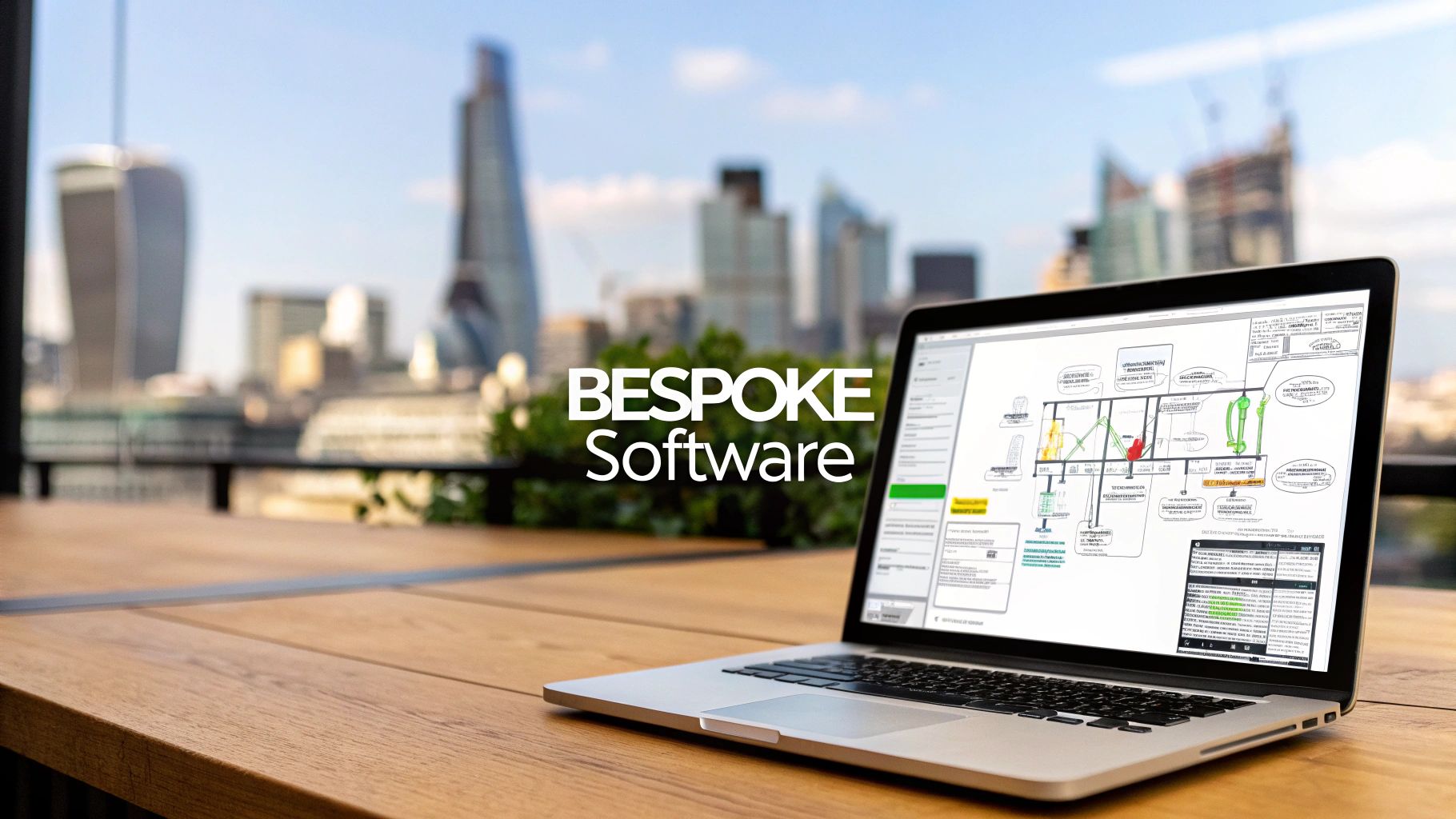 19.08.2025
19.08.2025
 19.08.2025
19.08.2025

Stripped back to its essentials, bespoke software is a custom solution built from the ground up for one specific organisation. It’s designed to solve your unique problems and fit your exact ways of working.
Think of it like getting a suit tailor-made. An off-the-rack suit might fit okay, but it was made for the average person. A bespoke suit, however, is cut and stitched to fit you perfectly—and only you. That’s the difference.

When you buy a standard software package, you often have to change your business processes to fit how the software operates. Bespoke software flips that idea completely on its head. The software is built to adapt to your business.
It’s designed to mirror your existing workflows, plug into the specific tools you already rely on, and tackle the niche problems that generic, one-size-fits-all solutions just can't handle.
This isn’t just a trend; it's a fundamental shift in how businesses operate. We're seeing more and more companies across the UK move away from generic products because they simply don't cut it. As highlighted in a piece on key trends driving UK business growth on London Daily News, this is part of a wider 'software revolution' where businesses demand tools that align perfectly with their goals.
The real power of a custom solution comes down to a few core traits that set it miles apart from pre-packaged alternatives. It’s not just about flashy, unique features, but about how every single part of the software is engineered to work inside your organisation.
Purpose-Built Functionality: You get everything you need and nothing you don’t. Every feature is there for a reason—to solve a specific challenge or improve a workflow. No bloat, no clutter.
Seamless Integration: It’s designed from day one to connect perfectly with the other systems you depend on, whether it's your CRM, accounting software, or inventory management. This creates a single, unified system instead of a patchwork of tools that don't talk to each other.
Full Ownership and Control: You commissioned it, you own it. This means you hold the intellectual property and aren’t locked into endless subscription fees or at the mercy of a vendor's roadmap.
At its heart, bespoke software is a strategic asset. It’s an investment in creating a tool that not only solves today's problems but is also flexible enough to evolve with your business tomorrow.
This is a crucial point. As your company grows and your processes adapt, your software can be updated and scaled right alongside you. That’s the kind of long-term value off-the-shelf products simply can't offer.
Okay, so we've covered what bespoke software is. But the real question is, what does it actually do for a business? Let's move past the theory and talk about the real-world impact you can see on your bottom line.
Think about all the little, repetitive tasks that eat up your team's day. That clunky manual data entry or the frustrating admin workarounds. The most immediate win with custom software is wiping those things out. It automates your unique workflows, giving your people the freedom to focus on the stuff that actually pushes the business forward.
Here’s where it gets interesting. Off-the-shelf software can feel like a box you’re trying to squeeze your growing business into. Eventually, you hit a wall. A bespoke solution, on the other hand, is built to grow with you. As you launch new services or expand into new markets, your software stretches and adapts right alongside you. No compromises needed.
This flexibility is your secret weapon. You can build features and processes that your competitors, stuck with their generic tools, simply can't copy. It’s how you create a genuinely better customer experience or make your operations leaner in ways they can only dream of. For a deeper dive, there's a great breakdown of the benefits of custom software that's worth a read.
This isn’t just a tech trend; it’s a strategic business move. Across the UK, confidence is high, with around 70% of companies expecting higher turnover. To handle that growth, they’re not just hiring more people; they’re building stronger foundations with custom tech.
I get it—the upfront cost of a custom build looks a lot bigger than a monthly subscription fee. But you have to play the long game.
Owning the software means you ditch those never-ending licence fees. That recurring operational cost transforms into a one-time capital investment, creating a valuable asset that belongs entirely to you.
Instead of being at the mercy of a vendor's update schedule and price hikes, you’re in the driver’s seat. You decide when and what to upgrade, based on your own priorities and budget. Our own guide to bespoke software development walks through how this works in practice. It's about taking back control and ensuring your most critical tool stays perfectly aligned with where your business is headed.

As much as we believe in the power of a custom-built solution, let's be pragmatic. Bespoke software isn't a silver bullet for every single business problem.
Sometimes, a ready-made, off-the-shelf product is the smarter, more sensible choice. Knowing when to go for a pre-packaged tool is just as crucial as knowing when to build your own.
Think about it. Many core business functions rely on standardised processes that are pretty much the same everywhere. Core accounting, payroll, or even general project management fall into this bucket.
These tasks don't typically give you a competitive advantage through customisation. In fact, there's a whole market of excellent off-the-shelf software designed to handle them perfectly.
Time and budget are usually the biggest deal-breakers. A startup needing to sort its finances now can't wait months for a custom build. If the upfront cost of a bespoke solution feels out of reach, a manageable monthly subscription to a market-leading tool is a solid business decision.
An off-the-shelf product is probably the better call in these situations:
You're in a hurry: You need a solution up and running this week, not six months from now. Off-the-shelf software is built for speed.
Your workflows are standard: Your processes for HR or customer relationship management (CRM) aren't unique to your business.
The budget is tight: The initial cash needed for custom development isn't there, making a predictable subscription fee a much safer bet.
The real question to ask yourself is this: "Will customising this process give my business a distinct competitive edge?" If the honest answer is no, then a pre-built solution is often the most logical path forward.
Ultimately, the choice isn't just about features; it's a strategic one. To help you weigh your options, our guide on bespoke software vs off-the-shelf solutions offers a much deeper comparison. It’s all about making sure you put your money where it will deliver the most value.
Building a piece of bespoke software isn’t like buying a product off a shelf. It’s more like commissioning an architect to design and build your dream house. It's a collaborative journey, a structured process that carefully turns a business idea into a living, breathing tool that works just for you.
The whole point is to make sure the final product is a perfect match for your vision and delivers real, tangible value. This means your team and the development experts work shoulder-to-shoulder, making sure every decision is pulling in the same direction—towards your goals.
This is where it all begins, and honestly, it's the most important part. Before anyone even thinks about writing a single line of code, we need to get under the skin of your business. The development team will spend time properly understanding your goals, your daily frustrations, and the exact problems you’re trying to solve.
They'll map out how you work now, spot the bottlenecks, and define the features that will make a difference. This all gets distilled into a detailed project blueprint. Think of it as the master plan for the entire project, covering what it will do, the timelines, and the tech behind it. It gets everyone on the same page from day one.
With a solid plan in hand, the focus shifts to a simple question: how will people actually use this thing? This breaks down into two key areas:
User Experience (UX) Design: This is all about the feel of the software. Is it intuitive? Does it make life easier? UX designers are obsessed with creating logical flows so the tool feels effortless to use.
User Interface (UI) Design: This is what you see—the buttons, the menus, the layout. A great UI doesn’t just work; it’s clean, appealing, and guides you where you need to go without you even noticing.
At this stage, you’ll likely see interactive prototypes or wireframes. These are basically digital sketches of the software. They let you click around and get a real feel for the user journey long before the heavy coding starts. This is a massive time and money saver, catching potential issues early.
Now the developers get to work, turning the blueprint into reality. They write the code, building the software feature by feature based on the plan we all agreed on. This usually happens in an agile way, breaking the work into small, manageable chunks called "sprints." It’s a great approach because it allows for regular check-ins and gives us the flexibility to make small tweaks along the way.
Once a feature is built, it's immediately handed over for rigorous testing and quality assurance (QA). Testers are ruthless—in a good way. They methodically hunt for bugs, errors, and any performance snags.
Crucial Takeaway: Testing isn’t just about finding what’s broken. It's about making sure the software is stable, secure, and performs flawlessly under pressure. It's about protecting your investment and your business’s reputation.
After passing every test thrown at it, the software is ready for launch. This is the deployment phase, where it gets installed on your servers and rolled out to your team. A good development partner won't just flick a switch and walk away; they'll manage the transition smoothly and provide training so everyone can hit the ground running.
But the relationship doesn't end there. Bespoke software is a living thing. It needs ongoing maintenance and support to stay secure, up-to-date, and running at its best. This long-term partnership ensures your software keeps up as your business grows and changes. When thinking about how to build out your team, exploring different models like nearshore software development can be a smart move for balancing cost, talent, and collaboration.

The idea of custom software is one thing, but seeing it out in the wild is where it really clicks. Across the UK, bespoke solutions are quietly becoming the secret weapon for some of our most complex industries. These aren't just generic tools; they're highly specific assets built to solve high-stakes problems.
Picture a manufacturing firm somewhere in the Midlands. They’re not wrestling with a clunky, off-the-shelf inventory system that almost works. Instead, they’re using a custom platform that tracks every single component in real-time, from the moment it leaves the supplier to the second it hits the assembly line. This thing predicts shortages, automates reordering, and gives them a live, bird's-eye view of their entire production floor.
This isn't just happening in factories. Over in the healthcare sector, providers are rolling out custom patient portals built to slot perfectly into existing NHS digital frameworks. These platforms don't just simplify appointment booking; they create secure lines of communication between patients and doctors and manage medical records in a way that’s fully compliant with strict UK data protection laws.
Then you have the financial services industry in London, a global powerhouse of banking and investment. The regulations here are some of the most intricate in the world. So, firms are commissioning bespoke compliance tools to monitor transactions, automatically flag potential risks, and generate reports that tick every single box for the Financial Conduct Authority (FCA).
These examples cut to the core of what bespoke software is: a direct answer to a critical business need that a generic product just can’t touch. It’s all about filling the gaps that one-size-fits-all software leaves behind.
It's this kind of targeted problem-solving that's really lighting a fire under the market. Forecasts for the UK's custom software development sector point to some serious growth, with projections showing a compound annual growth rate (CAGR) of around 24.82% between 2025 and 2035. This isn't just big corporations, either. Businesses of all sizes are fuelling this surge, all looking for that genuine competitive edge. You can dive deeper into the UK's expanding custom software market to see the full picture.
The common thread here is precision. Each solution is painstakingly crafted to solve a very specific problem within a specific industry.
Whether it’s streamlining logistics, locking down patient data, or navigating a labyrinth of financial regulations, bespoke software gives you a level of control and specialisation that off-the-shelf options can only dream of. That ability to build the perfect tool for the job is exactly why more UK businesses are deciding to invest in custom development.
Deciding to go down the custom-built software route is a big deal. It's more than just wanting a new, shiny tool; it's about hitting a wall with specific, high-stakes problems that off-the-shelf products just can't fix for your business.
So, how do you know if you've hit that tipping point? The clues are usually buried in the day-to-day frustrations and cobbled-together workarounds your team relies on. These little inefficiencies add up, quietly putting a ceiling on your growth and innovation. The first step is getting a real grip on things by understanding the digital demands and trends for your industry.
Before you even think about talking to developers, take a breath and be brutally honest about where you are right now. A simple self-check can cut through the noise and tell you if bespoke software is the right move or just a costly distraction.
Use this quick checklist to see if a custom software solution is a strategic necessity for your business. It's all about moving from vague feelings of inefficiency to a clear, data-driven decision.
| Consideration | Yes/No | Key Question |
|---|---|---|
| Operational Workarounds | Is your team drowning in spreadsheets and manual data entry just to connect different systems? | |
| Competitive Advantage | Do your unique business processes give you an edge that generic software is crushing? | |
| Scalability Blockers | Have you had to turn down work or pause growth because your current tools can't keep up? | |
| Inefficient Workflows | Are you paying for features you never use while still lacking the ones you actually need? | |
| Data Integration Issues | Is critical business data siloed across multiple, disconnected platforms? |
If you found yourself ticking "Yes" to most of these, it's a strong signal that you're hitting the limits of what off-the-shelf software can do. You’re not just looking for a new tool; you're looking for a solution that’s built around the very things that make your business unique.
Ultimately, the choice comes down to your long-term vision. Pinpoint your biggest roadblocks, map out where you want to be in five years, and ask yourself if a custom solution is the only real way to get there.

Even when the benefits seem obvious, jumping into a bespoke software project is a huge business decision. It’s completely natural to have a few practical questions.
Getting straight answers to the common "what ifs" and "how much" is the only way to move forward with real confidence. So, let’s tackle the big questions business leaders usually have when they first start exploring a bespoke solution.
This is always the first question, and the honest answer is: it really depends. The price tag is tied directly to how complex your project is, how many unique features you need, and the total time it’ll take to build.
Think of it less like buying a car and more like building a house from the ground up—the final cost comes down to the blueprint.
The initial investment is definitely higher than an off-the-shelf licence, but it’s a one-off capital expense, not a subscription that bleeds you dry forever. For a moderately complex app, you might be looking at a range of £20,000 to £50,000, though this can scale up quite a bit for larger, more intricate systems. Our guide on custom software development breaks down what goes into that number in more detail.
Just like cost, the timeline is all about the project's scope. A straightforward app with a handful of core features could be ready in 3-6 months. A complex system weaving together multiple integrations, on the other hand, might take a year or even longer.
The journey usually breaks down into a few key stages:
Discovery & Planning: Kicking things off right usually takes 2-4 weeks.
Design & Prototyping: This is where ideas take visual form, typically around 4-6 weeks.
Development & Testing: The longest phase by far, this can run from a few months to over a year.
Deployment & Training: Getting it live and your team up to speed takes about 1-2 weeks.
Any decent development partner will give you a detailed project roadmap with clear milestones right from the start. It keeps you in the loop, sets realistic expectations, and avoids any nasty surprises later on.
This is a big one, and the answer is simple: when you commission bespoke software, you own it. Every last bit of it.
The intellectual property (IP), the source code, the data—it all belongs to your business. This is a world away from off-the-shelf software, where you’re just renting the right to use someone else’s product.
Full ownership gives you total freedom. You can modify it, scale it, or even sell it down the line. It becomes a valuable asset that belongs entirely to you.